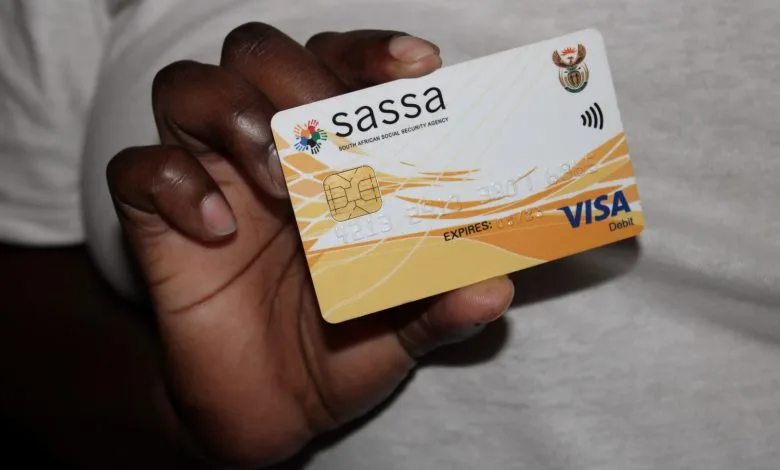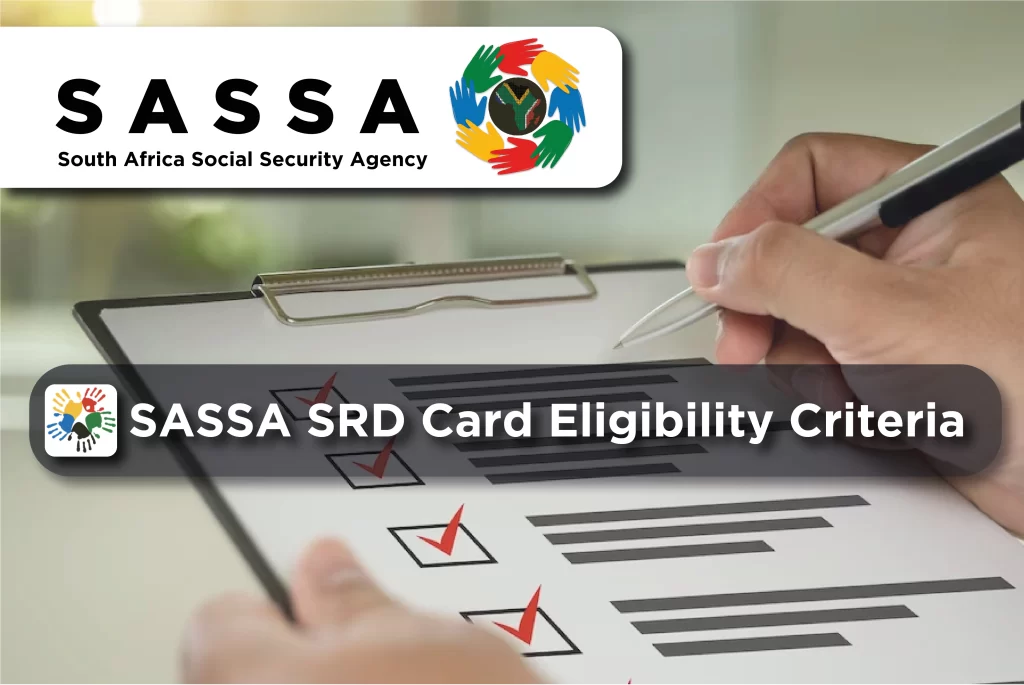SASSA SRD Card 2024 – How To Apply For SASSA Card?
The SASSA SRD card is a form of financial assistance the South African government provides to support vulnerable individuals and families during times of crisis or distress. It’s typically issued to those who qualify for social grants but have yet to receive them.
This card allows recipients to access funds for essential goods and services like food, clothing, and housing. The aim is to temporarily relieve those facing economic hardships, such as unemployment, disability, or other forms of financial insecurity.

Documents Required for applying SASSA SRD Card:
The requirements for obtaining a SASSA SRD card typically include:
- Proof of identity:
Valid identification documents such as an ID card, passport, or birth certificate are usually required.
- Proof of residence:
Applicants may need to provide documents showing their current address, such as utility bills or rental agreements.
- Financial eligibility:
Eligibility for specific social grants or relief programs may depend on factors such as income level, employment status, age, disability, or other forms of vulnerability.
- Application process:
Depending on the program, applicants may need to complete an application form and provide supporting documents to verify their eligibility.
- Compliance with program rules:
Applicants must adhere to the rules and regulations governing the specific SASSA program they are applying for, including any reporting requirements or conditions for receiving assistance.
Eligibility criteria for SASSA SRD Card:
The central aspect of the policy entails biometric verification for each applicant, accompanied by additional criteria, to obtain the SASSA SRD card. Below are the detailed eligibility requirements for securing the SASSA SRD card:
Citizenship:
The person should be a permanent resident of South Africa or an asylum seeker or have a special resident permit.
Age:
The applicants must be at least 18 years old.
SASSA Grant Recipient:
The applicant must be an active grantee of the SASSA Grant.
Income Limit:
The combined yearly income with their spouse should be R172,560 for married individuals. And for singles, the individual income must be below R86,280 per year.
Asset Limits:
Married couples should not own assets worth more than R2,455,400, while singles must keep their assets under R1,227,600.
Note: Online applicants require an active email address and access to an internet-enabled device, such as a smartphone, tablet, or computer.

Applying for a SASSA SRD Card: Methods and Steps
In-Person Application:
When they’re open, begin by visiting your nearest SASSA office or government service centre.
- Once there, ask the staff for an application form.
- Fill out the form accurately and make sure to provide all necessary information.
- After completing the form, hand it in and any required documents to the office staff.
- Remember to ask for confirmation that your application has been submitted.
Online Application:
- Start by checking SASSA’s official website to see if they offer online applications.
- If they do, fill out the electronic application form on the website.
- Be sure to follow any instructions regarding uploading scanned copies of required documents.
- Once you’ve completed the form and uploaded the documents, submit your application through the website.
Mobile Units:
- Watch for announcements about SASSA’s mobile units visiting your area.
- When the mobile unit comes to your location, head over there.
- At the mobile unit, ask for an application form from the staff.
- Please fill out the form and hand it in with the necessary documents to the mobile unit staff.
Community Hubs or Centres:
- Look into local community organizations, libraries, or centres for assistance with SASSA appeal.
- If they offer help, visit them during their operating hours.
- Get guidance from the staff and pick up an application form.
- Once you’ve completed the form, submit it with the required documents to the staff.
Postal Application:
- Reach out to SASSA or relevant authorities to find out how to request an application form by mail.
- Once you receive the form, please fill it out accurately.
- After completing the form, mail it back with any necessary documents to the provided address.
Assistance from Social Workers:
- If you need extra help, consider seeking assistance from social workers.
- Schedule an appointment with a social worker for personalized guidance.
- They can help you fill out the application form and gather any required documents during your appointment.
- Once everything is complete, hand your application to the social worker for processing.
Choose the best application method for you, and provide all necessary information accurately to ensure a smooth application process.
Benefits of SASSA SRD Card:
Here are some benefits of having a SASSA SRD Card:
Access to Social Grants:
The SASSA SRD card provides access to various social grants the South African government offers. These grants cater to vulnerable individuals and families, covering needs such as child support, disability, and eldercare.
Convenient Payment Method:
Acting as a versatile payment tool, the SASSA SRD card allows recipients to withdraw cash from ATMs, make purchases at point-of-sale terminals, and receive electronic transfers of grant payments, offering convenience in managing finances.
Security and Autonomy:
With the SASSA card, beneficiaries can securely access their grant funds without the need to carry significant cash amounts. Moreover, they retain control over their finances for essential purchases or electronic bill payments.
Final Words:
In conclusion, the SASSA SRD card is a crucial resource for vulnerable individuals and families in South Africa, offering essential financial assistance during crises. Eligibility is determined by citizenship, age, income, and compliance with program rules, and applications can be submitted through various channels. Once obtained, the card provides access to social grants, a convenient payment method, financial security, and a sense of empowerment. Overall, it is vital in supporting those in need and promoting social welfare in communities nationwide.


